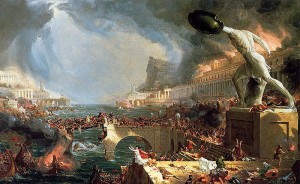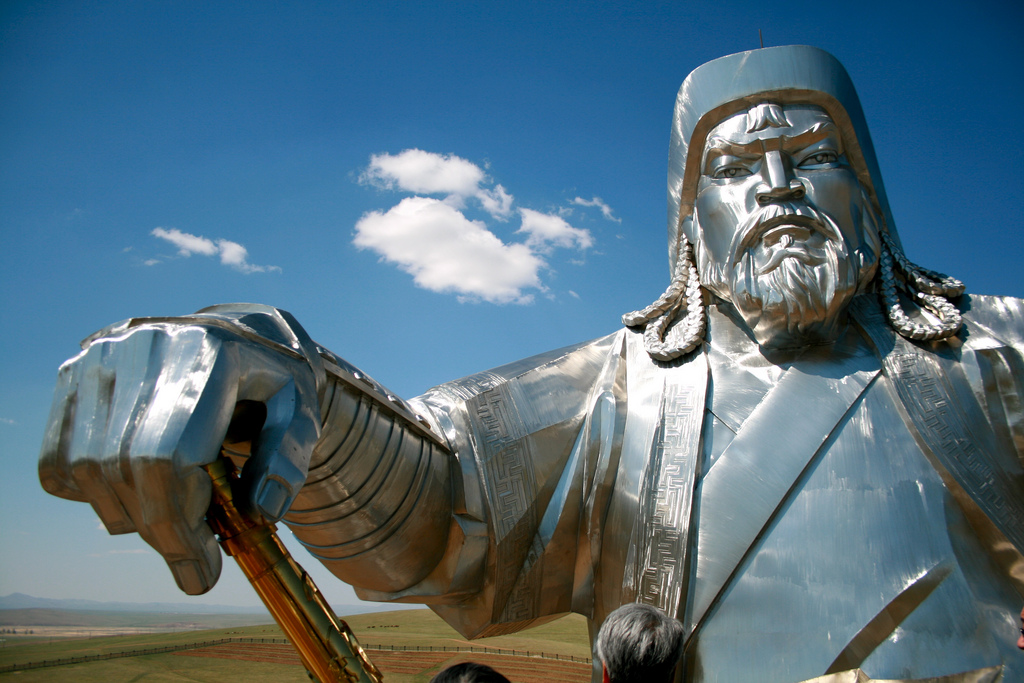When is a society prosperous? The general understanding seems to be it’s when everyone has an abundance of goods. But is this a useful definition? Are you prosperous if you have an abundance of goods, but no time to enjoy them? Are you prosperous if you have an abundance of goods, but you’re sick? Are you prosperous if you have an abundance of goods, but you live in an oppressive society? Are you prosperous if you have an abundance of goods but are desperately unhappy and feel you’ve wasted your life?
You can argue to keep it simple: Prosperity means everyone has access to a lot of goods and services. But I think this falls flat; we can all understand that more goods don’t necessarily make us better off, nor more services. More foods that make us sick aren’t better. More health care doesn’t mean we’re healthier, it often means we’re sicker. More prisons mean our society is producing more criminals and more crime.
Just increasing economic activity doesn’t make people better off, doesn’t increase prosperity.
The prototypical example of this is the move to agriculture. It would seem self-evident that learning how to grow more food has made us better off. More food is better, right? In fact, however, the move from hunting and gathering to agriculture led to lives which were worse, for the vast majority of the population. People were shorter in most agricultural societies, which indicates worse nutrition. There was far more disease and far more chronic health conditions. People also generally had less free time and they lived fewer years than the hunter-gatherers who preceded them.
Nor was this a short term decline, it lasted for thousands of years. Height is a good measure of nutrition, and we are still not as tall as our hunter-gatherer ancestors. Pelvic depth, which measures how easily women give birth has also never recovered. Median lifespan was not higher for around 6,000 years. And it declined for hundreds of years during that period in certain areas of the world. Members of the Hellenic world, from 300 BC to 120 AD, had longer lives than westerners before the 20th century.(1) Our lives can get worse, and stay worse, for hundreds or thousands of years, despite having more ability to create goods.
Are societies with more food and goods better if the people are sicker, live shorter lives, and have more difficulty reproducing? If that’s prosperity, do we want it?
Instead of more goods, more “stuff,” we should want the right goods and/or the right stuff. Stuff that makes us healthier, happier, smarter, more able to do great works, and to live well. Instead of more work, we should want right work, enough work to make the right stuff, but not so much work we have no time for our loved ones, friends, and doing the activities we love, whatever those might be. And, as much as possible we should want health instead of medicine and low crime rather than prisons.
All other things being equal, yes, more productive capacity is better. The more stuff we can make, in theory, the better off we’ll be. But in practice, it doesn’t always work that way.
Again, part of this is about the right stuff, or the wrong stuff. In our own society we are seeing an epidemic of obesity and diabetes due to our diet, for example. Part of that problem lay with modern hierarchies and inequality. Inequality is undeniably bad for us, as a whole. The more unequal your society is, the lower the median lifespan. The more unequal the society, the sicker, in general. More heart attacks, much more stress. The more unequal, the more crime. These links are robust.
The links run two ways. On the one hand, humans find inequality stressful. The human body, if subject to long term stress, becomes unhealthy and far more likely to be sick. People who feel unequal act less capable than those who feel equal. This is true for the rich and powerful in unequal societies and the poor. Everyone suffers. Though the poor and weak do suffer more, even the rich and powerful would be healthier and live longer in equal societies, most likely simply due to the stress effect.(2)
The second part is distribution, or rather, the question of who gets to control distribution. The more unequal a society, the less stuff the poor and middle class have, comparatively. Some technologies tend to lead to more inequality, some tend to lead to more equality. In most hunter-gatherer societies, there isn’t enough surplus to support a class of rich, powerful people and their servitors–in particular their servitors who enforce the status quo through ideology or violence. With little surplus, there is equality. This doesn’t mean hunter-gatherers live badly, most of them seem to have spent a lot less time producing what they needed than we do, they certainly didn’t work 40 hour weeks, or 60 hour weeks, closer to 20. (3) The rest of the time they could dance, create art, make love, socialize, make music, or whatever else they enjoyed.
Agriculture didn’t lead immediately to inequality, the original agricultural societies appear to have been quite equal, probably even more so than the late hunter-gatherer societies that preceded them. But increasing surpluses and the need for coordination which arose, especially in hydraulic civiliations (civilizations based around irrigation which is labor intensive and requires specialists) led to the rise of inequality. The pharoahs created great monuments, but their subjects did not live nearly as well as hunter-gatherers.
The organization of violence, and the technology behind it, is also a factor. It is not an accident that classical Greece had democracy in many cities, nor that it extended only to males who could fight and not women or non-fighting males. It is not an accident that Rome had citizenship classes based on what equipment soldiers could afford: the Equestrian class was named that because they could take a horse to war. It is not accident that the Swiss Cantons, where men fought in pike formation, were democratic for their time. Nor is it an accident that universal sufferage arose in the age of mass conscription and that women gained the vote as societies moved to mass mobilization.
When Rome moved away from citizen conscription to a professional army it soon lost its liberty. As we move away from mass armies it is notable that, while we haven’t lost the vote formally, the vote seems to matter less and less as politicians increasingly just do what they want, no matter what the electorate might have indicated.
Power matters for prosperity. The more evenly power is spread, the more likely a society is to be prosperous, for no small factions can engage in policies which are helpful to them, but broadly harmful to everyone else. Likewise, widespread demand, absent supply bottlenecks, leads to widespread prosperity as well.
In the current era, we have seen a massive increase in CEO and executive pay. This is due to the fact that they have taken power over the primary productive organizations in our society: Corporations. The owners of most corporations, if they are not also the managers, are largely powerless against the management. It is not that management is more competent than it was 40 years ago, at least at their ostensible job of enriching shareholders, it is that they are more powerful than they were 40 years ago, compared to shareholders and compared to government.
Because increases in the amount we can create do not automatically translate into either creating what is good for us, or into relatively even distribution of what we create, increases in the amount we can create do not always lead to prosperity. Likewise, it certainly does not naturally lead to widespread affluence. Productivity in America rose 80.4 percent from 1973 to 2011, but median real wages rose only 10.2 percent and median male wages rose 0.1 percent. (4) This was not the case from 1948 to 1973, when wages rose as fast as productivity did.
Increases in productivity, in our ability to make more stuff, only lead to prosperity and affluence if we are making the right stuff, and we are actually distributing that stuff widely. If a small group of individuals are able to skim off most of the surplus, prosperity does not result and if a society which is prosperous allows an oligarchy, nobility, or aristocracy to form, even if such an aristocracy (like our own) pretends it does not exist, society will find its prosperity fading.
Creating goods that hurt people is not prosperity either. Currently, about 40 percent of all deaths are caused by pollution or malnutrition.(5) If someone you love has died, there is a good chance they died because we make stuff in ways that pollute the environment, or because the stuff we make, like most of our food, is very bad for us. Being fat is not healthy, and we are in the midst of an obesity epidemic. Even when we do not immediately die, we suffer from chronic diseases at a rate that would astonish our ancestors. As of the year 2000, for example, approximately 45 percent of the US population suffered from a chronic disease. 21 percent had multiple conditions.(6) Some of this is just due to living longer, but much of it is due to the food we eat, the stress our jobs inflict upon us, and the pollution we spew into the air, land, and water.
We should always remember this. Increases in productive capacity and technological advancement do not always lead to welfare and when they do, they do not automatically do so immediately. The industrial revolution certainly did lead to increased human welfare, but if you were of the generations thrown off the land and made to work in the early factories, often 6 1/2 days a week, in horrible conditions, you would not have thought so. You were, in virtually every way, worse off than you were before by being thrown off the land, and so were your children. A few industrialists and the people around them certainly did very well, but that is not prosperity, nor is it affluence.
And a gain of affluence which lasts less than two centuries and ends in ecological disaster which kills billions, well, our descendents may not call that a success, or nor may they think it was worth it.
Prosperity, in the end, is as much about power and politics as it is about technology and productive ability. The ability to make more things does not ensure we are making the right things, or that the people who need them, get them. Productive capacity which is not shared is not prosperity.
- pg 23, Spencer Wells, Pandora’s seed
- Inequality book
- going from memory on this one
- http://www.epi.org/publication/ib330-productivity-vs-compensation/
- http://dieoff.org/page165.htm
- Anderson G, Horvath J The growing burden of chronic disease in America. Public Health Rep. 2004;119:263-70.
If you enjoyed this article, and want me to write more, please DONATE or SUBSCRIBE.


